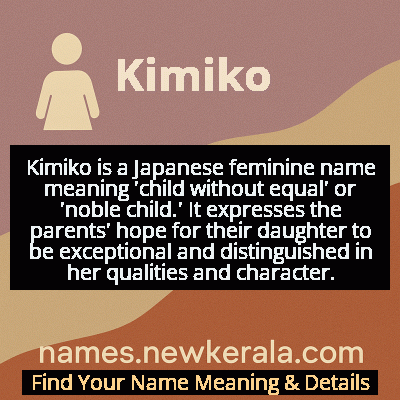Kimiko Name Meaning & Details
Origin, Popularity, Numerology Analysis & Name Meaning of Kimiko
Discover the origin, meaning, and cultural significance of the name KIMIKO. Delve into its historical roots and explore the lasting impact it has had on communities and traditions.
Name
Kimiko
Gender
Female
Origin
Japanese
Lucky Number
5
Meaning of the Name - Kimiko
Kimiko is a Japanese feminine name meaning 'child without equal' or 'noble child.' It expresses the parents' hope for their daughter to be exceptional and distinguished in her qualities and character.
Kimiko - Complete Numerology Analysis
Your Numerology Number
Based on Pythagorean Numerology System
Ruling Planet
Mercury
Positive Nature
Adventurous, dynamic, curious, and social.
Negative Traits
Restless, impatient, inconsistent, prone to indulgence.
Lucky Colours
Green, white.
Lucky Days
Wednesday.
Lucky Stones
Emerald.
Harmony Numbers
1, 3, 9.
Best Suited Professions
Sales, marketing, travel, entertainment.
What People Like About You
Versatility, charisma, adventurous spirit.
Famous People Named Kimiko
Kimiko Date
Professional Tennis Player
Former World No. 4 in singles, first Japanese woman to reach Wimbledon semifinals
Kimiko Ishizaka
Pianist and Music Producer
Renowned for her Open Goldberg Variations project and Bach performances
Kimiko Glenn
Actress and Singer
Known for her role in Orange Is the New Black and Broadway performances
Kimiko Soldati
Olympic Diver
Represented USA in 2004 Athens Olympics and won multiple national championships
Name Variations & International Equivalents
Click on blue names to explore their detailed meanings. Gray names with will be available soon.
Cultural & Historical Significance
Throughout Japanese history, names ending in '-ko' (meaning 'child') have been common for girls, with Kimiko specifically conveying the parents' hope that their daughter would be exceptional and noble. The name embodies the Japanese aesthetic of finding beauty in both uniqueness and tradition, making it a timeless choice that bridges generations. During its peak popularity, Kimiko represented the aspirations of many Japanese families for their daughters to embody both traditional feminine virtues and modern capabilities, reflecting the changing role of women in Japanese society while maintaining cultural continuity.
Extended Personality Analysis
Individuals named Kimiko are often perceived as graceful, intelligent, and possessing a quiet strength that commands respect. They tend to be thoughtful and observant, with a natural elegance in their demeanor and actions. Kimikos are typically known for their loyalty and dedication to their relationships and responsibilities, showing remarkable consistency in their character. These individuals often exhibit a blend of traditional values and modern thinking, making them adaptable yet grounded in their principles.
Kimikos are frequently seen as refined and cultured, with an appreciation for beauty in various forms—whether in art, nature, or human relationships. They tend to be selective in their friendships but deeply committed to those they care about, embodying the Japanese concept of 'omoiyari' (thoughtful consideration for others). Their strength often lies in their resilience and ability to handle challenges with poise and dignity, rarely showing outward distress even in difficult situations. This combination of grace under pressure and genuine warmth makes Kimikos memorable and respected individuals who often serve as stabilizing influences in their social and professional circles while maintaining their unique perspective and standards.
Modern Usage & Popularity
In contemporary times, Kimiko maintains a presence as a classic Japanese name that has seen fluctuating popularity. While it was extremely popular in Japan during the mid-20th century, its usage has declined among younger generations in Japan who favor more modern or Western-sounding names. However, the name has gained international recognition and is sometimes used by parents of Japanese descent living abroad or by non-Japanese parents who appreciate Japanese culture. In Western countries, Kimiko is occasionally chosen for its exotic yet accessible sound and its beautiful meaning. The name appears in various international contexts, from business professionals to artists, maintaining its association with elegance and cultural heritage. Recent trends show a slight resurgence in traditional Japanese names as people seek meaningful names with cultural depth, though Kimiko remains less common than more contemporary Japanese names for newborns in Japan itself.
Symbolic & Spiritual Meanings
Symbolically, Kimiko represents the ideal of exceptional quality and noble character, embodying the concept of rarity and preciousness in human form. The name carries deep metaphorical significance as representing someone who bridges different worlds—tradition and modernity, East and West, strength and grace. In Japanese cultural context, Kimiko symbolizes the flowering of human potential and the realization of inherent nobility that exists within every individual. The name suggests someone who can maintain their cultural roots while adapting to changing circumstances, representing resilience and enduring values in a rapidly evolving world. Kimiko also symbolizes the Japanese aesthetic principle of 'wabi-sabi'—finding beauty in imperfection and transience—through its combination of aspirational meaning with humble origins as simply 'child'.

